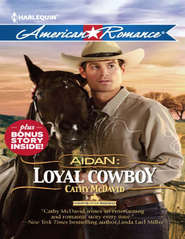По всем вопросам обращайтесь на: info@litportal.ru
(©) 2003-2025.
✖
Her Rodeo Man
Настройки чтения
Размер шрифта
Высота строк
Поля
Cassidy laughed. It wasn’t much of a laugh. More like a dry chuckle. Still, it beat the heck out of their mother’s forced cheerfulness at lunch the day before.
“Why are you really mad at me?” he asked.
“Tatum. She needs this job, Ryder. And you’re a threat to it.”
“Not as much as you think.”
“Dad has other ideas.”
Ryder considered leveling with Cassidy about this being a temporary stay until he landed another position. Gut instinct made him hesitate. “I’m not a threat to Tatum.”
“When she lost her job at the school, she also lost custody of her kids.”
“Wow! You’re kidding.”
“Temporarily lost custody. But she fell apart.”
“What happened?”
“Tatum’s good with money. But the divorce left her without any kind of nest egg. And you know what teachers make, especially in Reckless. Squat. She had no savings to fall back on when the school board laid her off last December. The extra money she makes off of her art classes is barely enough to put groceries on the table.”
“Couldn’t she find another teaching job outside of Reckless?”
“That takes time. She also had her house to consider. She didn’t want to move if she could help it.”
If anyone understood the difficulty of finding a good job and dwindling resources, it was Ryder. The past two months of searching had produced no results other than draining his bank account. Though what hindered his job search had less to do with lack of available employment and more to do with the bad reputation he’d created for himself at Madison-Monroe Concepts.
His stomach involuntarily tightened. He’d live down his mistake. Eventually. Come hell or high water.
“We gave her a job as office manager,” Cassidy continued, “and that took a lot of arm-twisting. Tatum is proud and refused what she called a pity job.”
“Dad says she’s pretty good at what she does.”
“She is. Which is why it’s not a pity job. But then the bank foreclosed on her house anyway when she couldn’t keep up with the payments. She and the kids moved in with us. Rent free. That was charity, and she struggled to accept it.”
“Seven people. Four bedrooms. It must have been crowded.”
“We didn’t care. But her ex-mother-in-law got wind of the situation and convinced her son to hire an attorney, claiming Tatum couldn’t provide adequately for the kids.”
“He sued for custody?” Ryder was appalled. “Why didn’t he help her make her mortgage payments? They’re his children, too.”
“It didn’t go that far. Luckily. Tatum compromised. She turned over care of the kids to her mother-in-law. Just until she saved enough money working for us to rent an apartment. It was a rough period for her. The kids, too. They missed Tatum and hated living with their grandmother.”
“Did she mistreat them?”
“No, no. She’s not the warm, cookie-baking kind of grandmother, but that wasn’t the problem. She lives in Glendale. A four-hour round trip. Tatum only saw the kids once a week at most. The day she signed the lease on her apartment, she broke down and cried in front of the rental agent.”
“She’s lucky to have you and Mom.”
“We’re lucky to have her. She works hard, even if an office manager isn’t her first choice of a job.”
“I do remember her drawing a lot. Always walking around with a sketchbook.”
Cassidy studied him critically. “So, you didn’t forget her entirely.”
“No.” But he hadn’t thought of her in years. A stark contrast to the past twenty-four hours. She’d been on his mind constantly. “You and she barrel raced.”
“We did. She met her ex on the circuit, and for a few years, they traveled from rodeo to rodeo, living in an RV. That wore thin on Tatum. She quit in order to obtain her teaching degree.”
“Her husband continued to compete?”
“Nothing would stop him. Tatum did her best to make the marriage work. Full-time job, full-time mom, part-time husband. When she got pregnant for the third time, he left for good, saying something like, ‘baby, I just can’t be tied down.’ She took it hard. I say the jerk didn’t deserve her, and she was better off without him.”
Ryder tended to agree.
“I’m not gossiping, so don’t think that.” Cassidy sipped again at her coffee. “I only wanted you to know what Tatum’s been through and why this job is important to her.” Her voice dropped. “Don’t mess it up for her.”
“I won’t. I promise.”
Cassidy looked skeptical.
“My plan is to create and implement a sound marketing strategy for the arena.” One Tatum or his mother could manage after he was gone.
Funny. He hadn’t realized until this moment how similar his and Tatum’s situations were. Both of them working interim jobs while hoping for a better one. Both of them resisting to take what they considered charity.
Okay, maybe that wasn’t so funny.
“What exactly is going on with Mom and Dad?” Ryder didn’t want to talk about Tatum anymore. “Do you think they’ll get back together?”
“God, I hope not.” Cassidy turned away from him to stare out the window.
It wasn’t eight in the morning, yet the ranch was alive with activity. Hands cleaning stalls. Customers exercising their horses. The carpenters Liberty had hired to construct the horse jumps were making a ruckus behind the barn, banging hammers and running the chain saw. Mercer conferred with a rep from the grain dealer.
“For once I agree with you.”
Her head swung back around. “Why do I think there’s a catch?”
“No catch. Mom threw him out. Abandoned him in his hour of need. Lied to him about being Liberty’s father. He’d be a fool to get involved again.”
“She had every right to throw him out,” Cassidy argued hotly. “He’s an alcoholic.”
Their parents had purchased the Easy Money before Ryder was born and had taken it from a run-down, dirt-poor arena to the best facility in the southern part of the state. That all changed when Ryder’s grandfather died suddenly from a heart attack, and his father began drowning his grief with whiskey. Daily.
In less than a year, the arena went from prospering to the verge of bankruptcy, and Ryder’s mother kicked him to the curb. What Ryder knew and his sisters didn’t until recently was that their father retained his half ownership of the arena. Their mother had also never paid their father his share of the profits per their settlement agreement. The sum was staggering.
“Reformed alcoholic,” Ryder said. “He hasn’t touched a drink in over twenty years.” He’d stopped shortly after Ryder moved in with him.
“Once an alcoholic, always—”











